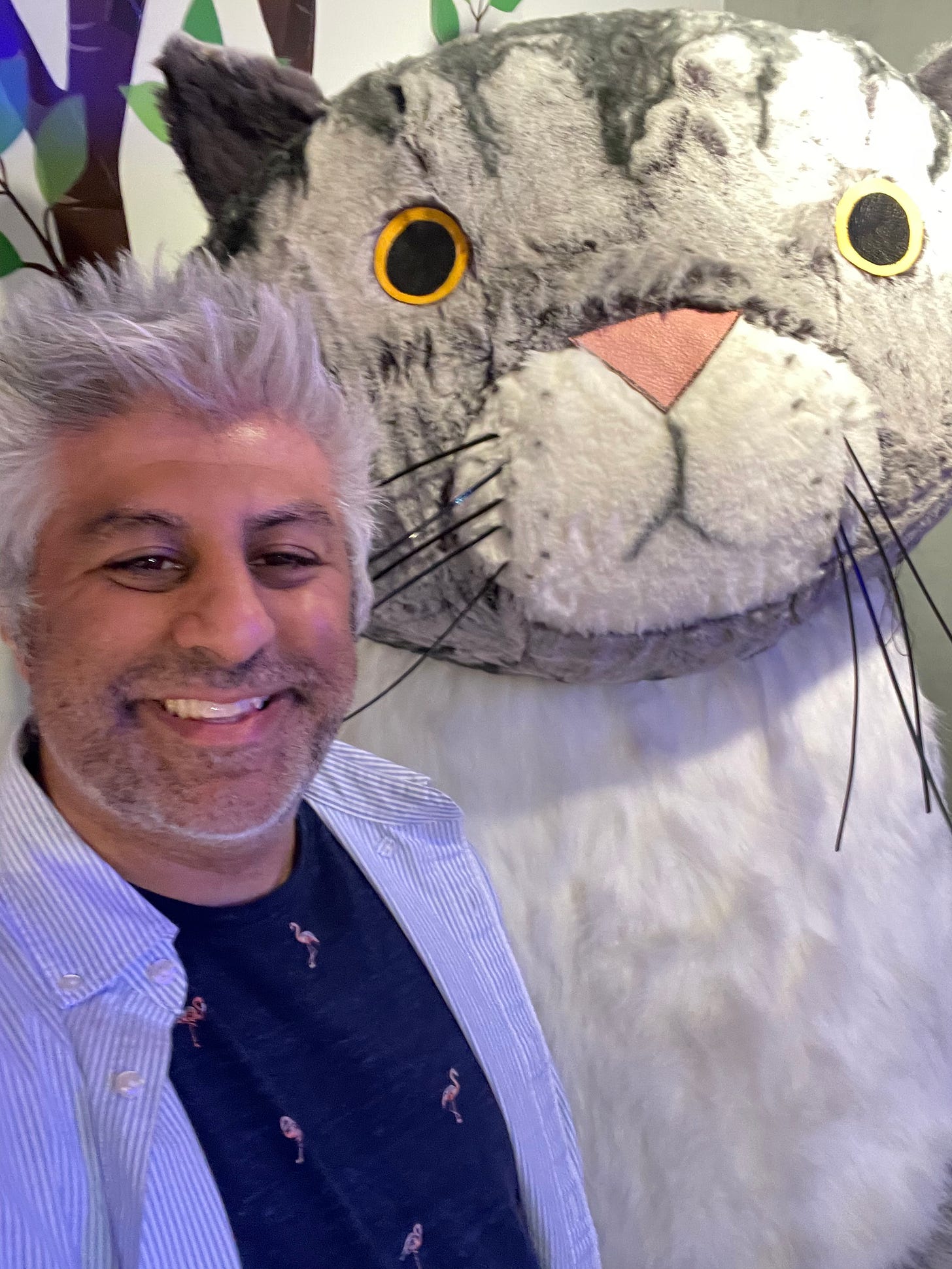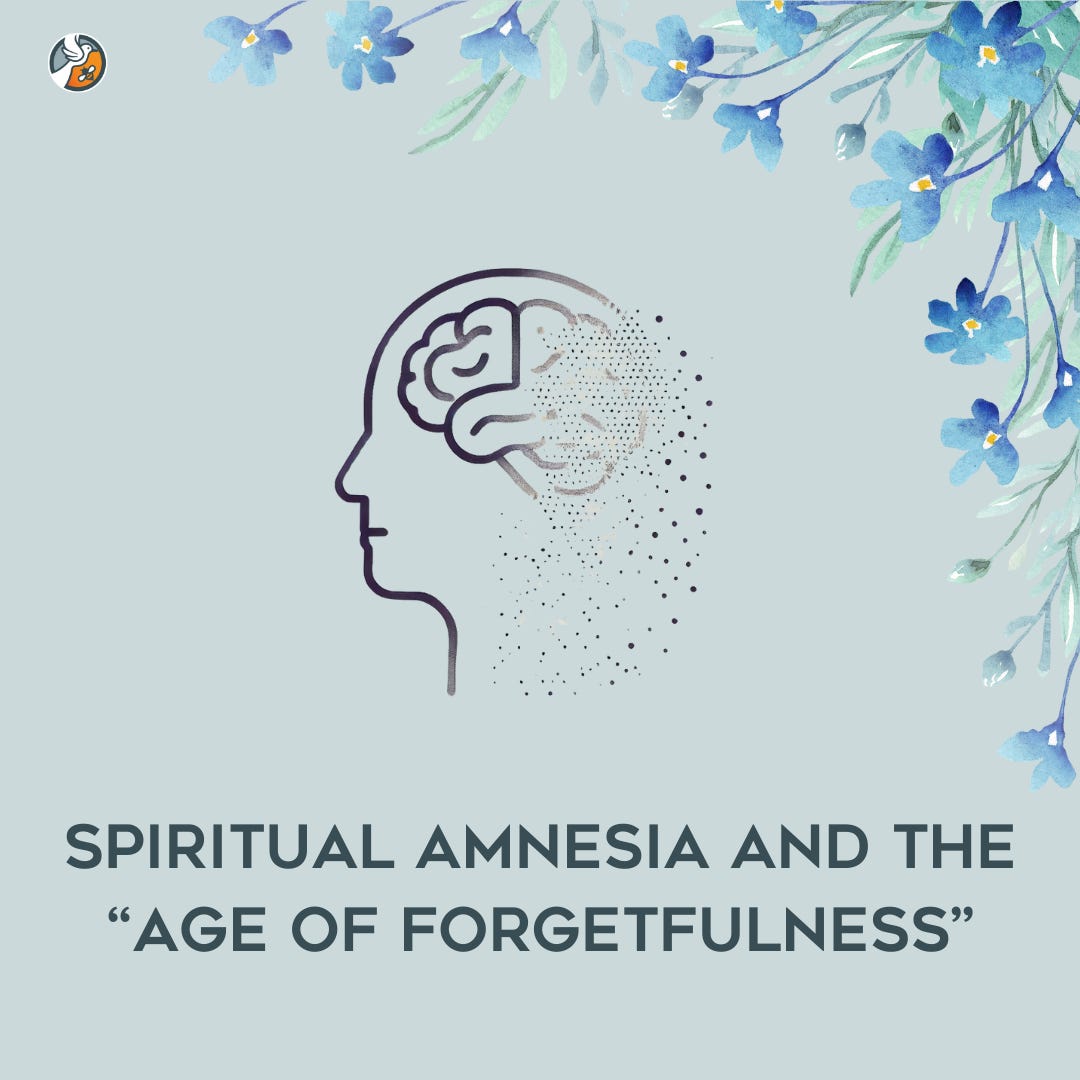Spiritual Amnesia and the Age of Forgetfulness
How Distractions Keep Us from Remembering Our Creator... and Ourselves
In the summer, I visited Seven Stories - The National Centre for Children’s Books in Newcastle with my family. We love stories as a family so it was a great experience and we had a fun time.
We also got to see a lifesize version of the Tiger (from the famous Tiger Who Came to Tea) and a classic from my childhood, the legendary Mog the Forgetful Cat. (If you know, you know!)
In the books, Mog’s forgetfulness was endearing, even humorous. And it got her into a lot of trouble!
But in real life however, forgetting isn’t always quite so innocent.
We see it now more than ever.
We live in an age of forgetfulness - particularly about our Creator, our purpose, and ourselves.
Some would say the very purpose our world is so full of distraction and entertainment is for this very outcome. So it’s only natural we forget.
We’re in an environment designed for this objective.
But this is a slippery slope.
Forgetting who we are - and who created us- is the first step toward losing ourselves entirely.
The Quran says:
"Do not be like those who forgot Allah, so He made them forget themselves."
—Surah Al-Hashr (59:19)
This ayah is scary.
This one verse of the Qu’ran was so profound that it was what the great poet and philosopher Allama Iqbal based his entire philosophy around.
When we forget Allah, it’s not just Him we lose touch with.
We lose our true selves.
So, what does it mean to forget oneself?
It’s not just absent-mindedness like Mog’s. It’s:
Forgetting you were created for a purpose - day-by-day, getting deeper entrenched within the dunya.
Ignoring the divine spark within you - the connection to your soul - leaving you hollow and disconnected.
Losing yourself in distractions, where materialism and shallow pursuits become your masters.
We seek meaning in the wrong place whether it be in titles, wealth, and meaningless social media likes.
This “forgetfulness” is why so many of us feel stuck, anxious, and disconnected.
We chase validation, yet it doesn’t satisfy.
We achieve success, yet feel empty.
Why?
Because no amount of worldly noise can replace the sound of your soul calling you back to your Creator.
Today, we’ve traded self-awareness for self-obsession. These are the sad symptoms of what I like to refer to as ‘spiritual amnesia’.
Because the soul can never be fed by what it was never created for.
Look around you:
89% of young people in Britain aged 16-29 believe their life lacks purpose.
Depression rates have skyrocketed by 30% globally in just 10 years.
Anxiety rates have doubled in a decade.
We’re more “connected” apparently, yet lonelier than ever before.
These are certainly symptoms of a deeper crisis.
Our souls are starving for connection - with the One who created us.
Rediscovering yourself starts with remembering Allah.
Here’s how:
Reconnect with your Creator. It starts with prayer, dhikr, and dua - not as a ritual, but as a lifeline. Call out to Him. Dhikr means remembrance - and the recitation of the Qu’ran is the best remembrance.
Reflect on your soul’s purpose. Why were you created? What does your Creator want from you? What IS your Divine Duty? Are you working towards it?
Recalibrate your life. Remove distractions that drown out the call of your soul. Start a meaningful practice - do an audit of every activity you do for a week which asks the question - is this taking me closer or further away from my divine duty?
What happens when you do this?
Well, Iqbal called it khudi: the awakening of the self.
But the journey to that beautiful outcome needs a focused path to follow. You need to work diligently towards it.
You’ll never find khudi in the world’s noise - it’s found in alignment with your Creator.
A Final Lesson from Mog
Mog may have been forgetful, and it often got her into trouble — but someone always cared for her.
In the same way, even in our forgetfulness, Allah’s mercy is endless and surrounds us.
No matter how far you’ve strayed, the door back to Him is always open.
The Quran promises:
"And those who strive for Us—We will surely guide them to Our ways." (Surah Al-Ankabut, 29:69)
Iqbal used to refer to a concept called “spiritual apathy”:
“If faith is lost, there is no security and there is no life for him who does not adhere to religion.” - Muhammad Iqbal
Essentially, spiritual apathy occurs when one’s faith is being lost, which leads to the soul dying, and eventually, your entire existence becomes meaningless. You end up living a lie.
But when faith returns?
EVERYTHING changes, I promise you that.
The journey back is not easy, sure, but it IS transformative.
Your life will completely change.
If you’ve felt lost, hollow, or unsure of your purpose, know this:
You weren’t created for emptiness.
You weren’t created to chase distractions.
You were created for something eternal.
You’re not alone.
The path back starts with one choice: to remember.
I created the Know Your Purpose Program for this exact reason.
Let’s remember who you REALLY are - together.
If you’re interested in figuring out your divine duty and finally achieving your immense potential, there’s a few things you can do.
1) Check out our free quiz and see how aligned your current life is with your life’s true purpose
2) If you’d like to improve your score or learn more you can apply to book in a free discovery call with me or my team.
3) If you’d like to join a community of fellow lifelong learners and those in pursuit of their purpose, you can do so here: https://www.skool.com/kn-ow/about - and check out the free purpose mini-course in the classroom while you’re there!
4) Finally, if you’d like to work with me on this journey, either in a group setting or on a 1-2-1 then send me a message saying MOG (I’ll know what that means!) and I’ll get back to you with the next steps!







This was such a good read Faisal. Not to self promote here, but I just shared a new issue where I talk about how I was not in touch with my faith. It led me to a life where I had almost everything materialistically speaking yet it was an unhappy time for me.
I was always looking for ways to find faith in myself, but how could I when I was so disconnected from our Creator?
It was after I started practicing my faith when I found faith in myself too.
It’s so uncanny how your post landed in my inbox a couple of hours after I posted my experience with reconnecting with my faith.
Thank you for such a thoughtful piece. I really enjoyed it.
Wajeeha